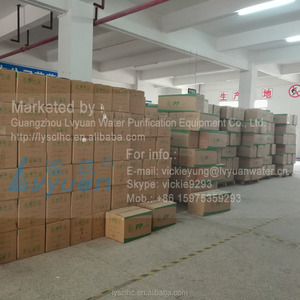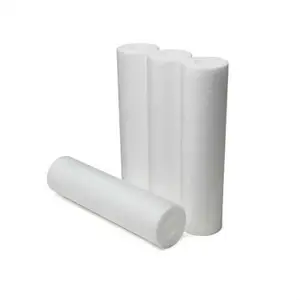Types of 20 pp sediment filters
The global sediment filter market was worth about $1.3 billion in 2022 and is expected to grow due to the rising need for clean water. Filters give end users clean, filtered water by removing sediment. They are essential for households and industrial applications that need top-notch water.
The 20-pp-sediment-filter comes in different types, each with its own benefits:
-
The Polypropylene Sediment Filter
PP filters are made from filter material made of polypropylene. They can work in high and low temperatures. The filter draws the PP material through a melting process that physically removes impurities. It is strong and resistant to humidity and can remove up to 99.98% of particles. These types of filters are useful for marine and industrial applications.
-
The Pleated Polyester Filter
The 20-pp sediment filter also comes in a pleated polyester type. It is made from multiple pleats of polyester and has a large surface area. The water flows through the filter and gets trapped in the pleated folds. Its high dirt holding capacity lets it catch a lot of impurities. Because of its reusable feature, it helps save costs in industries with high filtrations needs. It is ideal for pulp and paper, paint, and petroleum industries.
-
The String Wound Sediment Filter
String Wound Sediment filters are made from multiple strands of cotton, linen, or synthetic fibers. The strands get wound around a central core in a precise pattern. As the water flows through the filter, the strands trap dust and sediment. These types of filters are more cost-effective than others, but they have lower dirt-holding capacity. They are primarily used in well-water applications and municipal water systems.
-
The Melt Blown Cartridge Filter
Melt-blown sediment filters are made from a single solid block of polypropylene. They go through a melt-blown process that creates homogeneous filter elements. This makes the filters dense, with a uniform particle removal efficiency. The filter's density also increases as the water moves outward. This helps improve the filter's ability to catch particles the more it gets used. These types of sediment filters are used in food and pharmaceutical industries.
Function and Features of 20 pp sediment filter
The main function of a 20-micronpp silt filter is to rid water of sediment particles. This helps to keep the water clean and extends the service life of other filters and equipment. Here are more functions and features of the pp sediment filters in the 20-inch scale;
- Improved Water Quality: Sediment is a known cause of cloudy or dark water. The 20 pp sediment filter removes it from the water and improves its appearance. This filter also protects against sediment-related ailments, thereby improving quality and public health.
- Multi-Layered Filtration: Some filters have a multi-layered structure. The outer layer has larger pores, and as the filter gets deeper, the pore size keeps getting smaller. The filter's inner and outer layers ensnare sediment particles as water flows through them.
- Edge-Wound Design: Edge-wound pp sediment filters have an edge-wound structure. The filter is wound around a central pole and has many layers. The layers trap particles as water goes through the filter. This type has a larger dirt holding capacity. It is best for wounds that have a higher level of turbidity or sediment.
- String Wound Filters: These pp filters have a string-wound design. They are made by winding filter strings around a central core in a concentric manner. The yarns have uniform porosity, and the filter can trap particles of different sizes. Its reliable filtration makes it suitable for industrial and commercial use.
- String Filter: This type of filter also has a string-wound design, but it uses a finer filter string. The filter's precise filtration makes it well suited for drug and food production.
- Increased Flow Rate: Reduced pressure drop is a major advantage of pp filters. Their large pore structure allows for a fast flow rate and easy passage of water. However, large flow rate and reduced particle filtration efficiency are a trade-off for less effective particle filtration.
- Higher Contaminant Retention: The 20pp sediment filter can hold on to contaminants for a longer period. The filter has a higher dirt retention capacity, which makes it suitable for locations with a high amount of sediment. It also reduces the need for filter replacement and offers a more reliable filtration.
- Corrosion Resistance: These filters are resistant to corrosion, which increases their lifespan. Their corrosion resistance makes it suitable for filtering industrial or sea water with a high pollutant concentration.
Use Cases of 20 pp sediment filter
20 pp sediment filters have a wide array of applications. They are used in different industries to improve water quality. Some common uses include;
- Aquariums; The 20 pp filter helps to remove debris from the water, creating a safer and cleaner environment for fish and other aquatic organisms.
- Swimming pools; The 20 pp sediment filter helps to keep the pool clean by removing fine particles. This allows pool filters and pumps to work more efficiently.
- Hydroponics; In hydroponics systems, the filter removes sediment and particles from the water supply. This keeps the nutrient solution clean and prevents system clogging.
- Industrial applications; In many industrial operations, sedimentation can occur in process fluids. This can lead to equipment damage or system failure. The 20 pp filter aids in protecting pumps, valves, and other components from abrasion and clogging.
- Marine applications; In marine environments, the filter can help to extend the lifespan of engines, reduce maintenance costs, and ensure the efficient operation of boats and ships.
- Carbonated beverage production; The filter improves the quality of water used in making carbonated beverages. It removes contaminants that may affect the taste, clarity, and quality of the end product.
- Food industry; In the food processing industry, the filter removes particles and impurities from water and other liquids. This helps to safeguard the equipment and ensure the safety and quality of food products.
- Well water treatment; Homeowners use the filter to reduce sediment in well water. It protects the health of the household by improving the water's taste, clarity, and quality.
- Irrigation systems; The filter is useful in protecting drip lines, sprays, and other irrigation system components from clogging.
- Roads and construction sites; The 20 pp filter helps to prevent erosion and sediment from entering adjacent wetlands and water bodies by keeping silt out of the water. This promotes the protection and maintenance of aquatic ecosystems.
How to Choose 20 pp sediment filters
Obtaining the correct sediment filter is vital for any successful application. It is necessary to consider various aspects to make the right choice per the specific needs.
- Micron rating: The sediment filter's micron rating is a crucial factor that determines the particle size the filter can trap. A lower micron rating indicates a higher level of filtration.
- Filter material: Different materials have different retention efficiencies, durability, and properties. Hence, assessing the filtering material and its benefits and drawbacks is essential before obtaining one.
- Filter type: The two main types of filters are absolute and nominal. Nominal filters are more efficient, but absolute filters have greater consistency.
- Temperature and pressure: Each application has its temperature and pressure conditions. Therefore, the 20 pp sediment filter should be chosen based on its ability to meet the temperature and pressure needs of a specific application.
- Compatibility: The sediment filter should be compatible with the existing system. Otherwise, it may not work efficiently or cause damage to the system.
- Contaminant type and particle size: The 20 pp sediment filter is designed to remove various impurities from the water, such as dirt, sand, silt, and rust. Determining the type and size of particles that need to be removed is essential for choosing the right filter.
- Flow rate: The flow rate of the sediment filter is vital for any intended use. Therefore, the required flow rate must be determined to choose the filter that meets specific needs.
- Budget and replacement: The budget for sediment filter installation and maintenance is essential for any business. It is necessary to study the frequency of filter replacement and costs to make the right choice.
- Certifications and Standards: The sediment filter must meet the relevant certifications and standards for assurance. Obtaining filters that have been verified by third parties is a plus.
Q&A
Q: What is the difference between a 5-micron and a 20-micron filter?
A: The 20 pp sediment filter removes larger particles down to 20 microns, while the 5-micron filter removes all the way to 5 microns. The coarser filter is used for pre-filtering, and the finer one is for final filtering.
Q: How often should sediment filters be replaced?
A: The 20 pp filter's replacement depends on the quality of the water it is filtering, the amount of sediment, and the particular application being used. It is usually replaced every 3 months but can be more frequent or less.
Q: Can sediment filters be cleaned and reused?
A: Some filters can be cleaned and reused, but only those that are expressly made for that purpose. Before cleaning any filter to be reused, make sure that it is safe for washing and repeatedly used.
Q: What is the best hose for a pool cartridge filter?
A: The best hose for a pool cartridge filter is a heavy-duty pool hose specifically designed for pool filtration systems. These hoses are reinforced, leak-proof, and capable of withstanding the suction power of the filter without kinking.
Q: What is the best way to store sediment filters?
A: Sediment filter storage is best in a cool, dry place away from direct sunlight. This will protect the filters from temperature extremes and harmful UV rays. The filters should be stored in their original, unopened packaging to keep them clean and prevent contamination.














































































































































































































